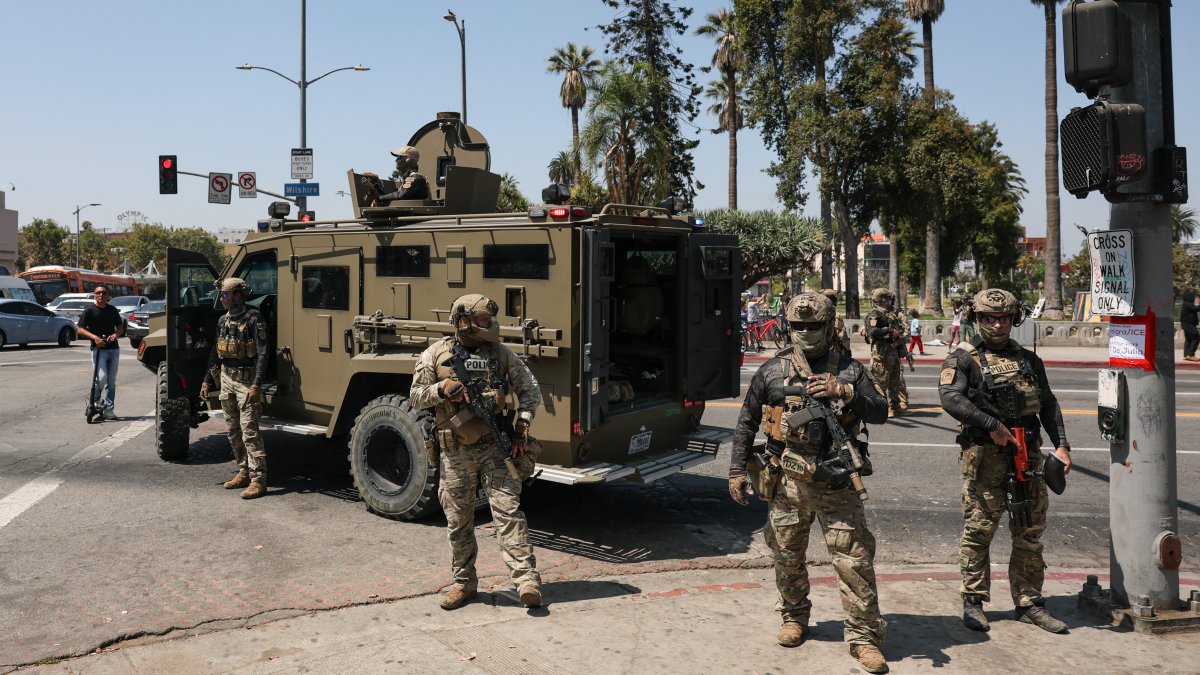What to Know
- Immigrant advocates filed a lawsuit in early July that accuses “unconstitutional” tactics during immigration enforcement operations in Los Angeles.
- The lawsuit sought a temporary restraining order, granted by a federal judge, to block the administration from using the disputed tactics.
- Attorneys with Public Counsel and the American Civil Liberties Union said the lawsuit is intended to ensure people detained are given their legal right to meet with a lawyer.
- The lawsuit also seeks to stop “roving patrols” of agents that the plaintiffs claim are detaining people without warrants or probable cause.
- An attorney for the federal government denied the accusations, saying the enforcement activities are based on “reasonable suspicion” and the “totality of the circumstances.”
A hearing is scheduled for Monday on the Trump administration‘s request to pause a judge’s decision earlier this month to grant a temporary restraining order over how the federal government conducts immigration enforcement operations in Southern California.
Trump administration attorneys will argue before the U.S. Court of Appeals for the Ninth Circuit in San Francisco for a stay, pending appeal of the temporary restraining order.
The hearing was expected to start early Monday afternoon. It was not immediately clear when the panel will issue a decision.
The hearing will likely determine whether federal agents can continue immigration enforcement operations as they have since early June as a district court considers a preliminary injunction.
The legal move is the latest development stemming from a federal judge’s July 11 ruling that granted the restraining order requested by immigrant advocates in an effort to restrict federal immigration enforcement operations in Los Angeles and other parts of Southern California. Judge Maame E. Frimpong’s order barred the detention of people unless the officer or agent “has reasonable suspicion that the person to be stopped is within the United States in violation of U.S. immigration law.”
It stated the defendant may not base that suspicion solely on apparent race or ethnicity; speaking Spanish or speaking English with an accent; presence at a particular locations like a bus stop or day laborer pick-up site. The federal lawsuit accuses President Donald Trump’s administration of systematically targeting brown-skinned people in an immigration crackdown that has the region “under siege.”
The judge also issued a separate order barring the federal government from restricting attorney access at a Los Angeles immigration detention facility. It would also allow confidential phone calls to detainees.
The White House called the ruling a “gross overstep of judicial authority to be corrected on appeal.”
Attorneys with Public Counsel and the American Civil Liberties Union said the lawsuit is intended to ensure people detained in the aggressive enforcement operations are given their legal right to meet with a lawyer. The plaintiffs are also pursuing an end to so-called “roving patrols” of agents they claim are detaining people without warrants or probable cause.
An attorney for the federal government denied the accusations, saying the enforcement activities are based on “reasonable suspicion” and the “totality of the circumstances.”
U.S. District Judge Maame Ewusi-Mensah Frimpong appeared critical of the government’s arguments in court, saying she wanted to hear more specifics and fewer generalities.
The Trump administration has stepped up efforts to realize his campaign pledge of deporting millions of immigrants in the United States illegally. The administration has highlighted arrests involving undocumented individuals with violent crime convictions. Those who have been caught up in the nationwide raids include asylum seekers, people who overstayed their visas and migrants awaiting their day in immigration court.
Through July 17, nearly 56,400 migrants had been taken into ICE detention since the start of President Trump’s second term, according NBC News, which used ICE data both public and internal as well as data from the U.S. Customs and Border Protection agency.
About 29% of those in detention had criminal convictions; 24.6% had pending criminal charges; 47.4% were listed as “other immigration violator;” and 11.9% were fast-tracked for deportation.
California is home to 10.6 million immigrants, more than any other state, according to the Public Policy Institute of California. The Pew Research Center estimates that 1.8 million immigrants in California were undocumented in 2022, a figure that dropped from 2.8 million in 2007.
